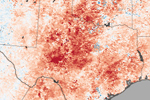Megafires are likely both worsened by and contributing to global climate change, according to a new United Nations report. In the tropics, deforestation is playing a major role in creating giant, unprecedented fires.
“These extraordinary conflagrations [or ‘megafires’] are unprecedented in the modern era for their deep and long-lasting social, economic, and environmental impacts,” reads the report, adding that “among all wildfires, mega-fires are the most costly, the most destructive, and the most damaging.”
The report analyzed eight recent ‘megafires’ around the world that have charred millions of hectares, killed hundreds, and burned thousands of homes. In seven out of eight of the giant fires analyzed, researchers found that drought was a contributing factor. Worsening droughts around the world are linked to climate change, likely making megafires also linked in part to a warming world.
In the tropics, widespread deforestation has set new ecological conditions that allow fires in a region where they should be almost non-existent.
“Vulnerable vegetative conditions are fueling the mega-fire threat. In exploited tropical forests, ‘high-grade’ logging, land clearing, and wholesale site conversions have left high volumes of slash and debris behind [as fodder for fire],” explains the report.
But deforestation and climate change aren’t just making fires worse. Runaway, epic blazes—such as the one last year in Russia that devastated a third of the state’s globally important wheat crop—are also adding greenhouse gas emissions that worsen climate change.
“Massive amounts of carbon release were documented on some of the megafires examined here. In several countries, wildfire emissions are exempt from regulatory controls,” reads the report, which explains that megafires are an unrecognized positive feedback loop in the climate cycle that should be addressed.
“Because CO2 emissions contribute to global warming and mega-fires are the result of drought, mega-fires (and carbon releases) may represent a dangerous feed-back loop that becomes self-perpetuating in the absence of stronger wildfire emissions monitoring and control.”
Pieter van Lierop, forestry management officer for the UN’s Food and Agriculture Organization (FAO), told Voice of America (VOA ) news that given predictions of worsening droughts worldwide, megafires will likely become even more frequent. Already this year, Texas has seen one of its worst wildfires in its history, with thousands of fires burning up nearly a million hectares. Like most of the other megafires, Texas’ blazes have occurred under drought conditions.
The report recommends countries employs new methods and change forest-fighting policies in order to better mitigate fires before they become mega.
Related articles
Are US floods, fires linked to climate change?

(04/28/2011) The short answer to the question of whether or not on-going floods in the US Midwest and fires in Texas are linked to a warming Earth is: maybe. The long answer, however, is that while it is difficult—some argue impossible—for scientists to link a single extreme weather event to climate change, climate models have long shown that extreme weather events will both intensify and become more frequent as the world continues to heat up. In other words, the probability of such extreme events increases along with global average temperature.
Burning up biodiversity: forest fires increase in Madagascar
(01/10/2011) The number of fires burning in and around forests in the northeastern part of Madagascar increased during the 2010 burning season relative the the year before, according to analysis of NASA data by WildMadagascar.org / Mongabay.com. The rise in burning corresponds to an especially dry year and continued illegal logging of the region’s biologically-rich rainforests.
Satellite data reveals fires in region plagued by illegal logging in Madagascar
(12/27/2010) New satellite data reveals active burning in Sava, a region in Madagascar that has been ravaged by illegal logging for rosewood and other valuable rainforest timber.